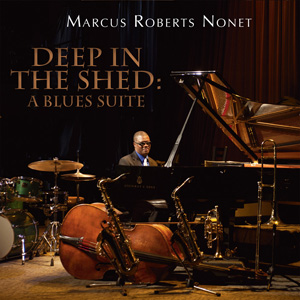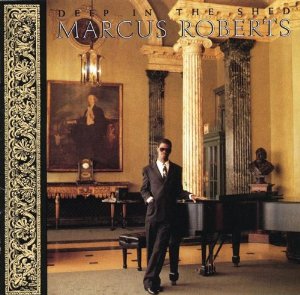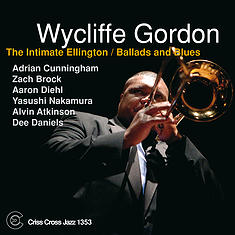- Marcus Roberts: piano
- Rodney Jordan: bass
- Jason Marsalis: drums
- Ron Westray: trombone
- Marcus Printup: trumpet
- Stephen Riley: tenor sax
- Wess Anderson: alto sax, sopranino
- Alphonso Horne: trumpet
- Ricardo Pascal: tenor sax
So twenty years went by and Marcus Roberts decided to go back to one of his earliest recordings and do it over again. It’s hard to know for sure why he decided to redo this one, other than the fact that it was a cohesive unit of music composed as a suite. In the liner notes he mentions resequencing the individual numbers and says this time he’s done it in the order he had originally intended. Why the first recording got reordered remains a mystery but I can’t help but wonder if it was something forced on him by the producers and now he’s finally setting things straight. Unfortunately the explanation of the favored sequence is pretty technical, having to do with chord modulations and fourths… not something the casual listener is likely to pick up on very easily. Sort of reminds me of Glenn Gould’s explanation for his second recording of Bach’s Goldberg Variations. In the liner notes of the second recording from 1982 it says, “Gould has offered only the explanation that new technology plus his own desire to re-examine the work in terms of its ‘arithmetical correspondence between theme and variation` led him back into the studio for this recording. Any more complete explanation of this new approach would, according to Gould, entail a complete written analysis, in an almost book-length essay…”
Whatever the reasons, what we have here is a newly released CD by Marcus Roberts. The tunes are familiar, but the band is new, with Roberts and Wes Anderson being the only two carryovers from the first recording. And the overall feeling is distinctly different. For starters Roberts has chosen a different recording venue for this new venture. While some of the original recording was done in a hall, much of it was recorded in a studio. The new recording was done entirely in an auditorium and it is immediately apparent. There is a distinct acoustic signature that almost suggests a live recording. This sounds like a band performing for a crowd and in fact at one point in the sixth cut it does sound like there is a live crowd in the background, although there is no evidence of such in the rest of the recording. In comparison, while the original recording was truly impeccable, it almost has a clinical feel to it compared to this reworking.
So, what else has changed? It almost goes without saying that this recording isn’t quite as serious as the original. Honestly, I don’t know how any musician could maintain that level of seriousness and gravity for two decades. Even if they tried, I’m afraid that at some point it would begin to sound contrived. It was an accurate reflection of where Roberts and his fellow musicians were back then. But two decades have passed. The “movement” has succeeded. There is a new standard for young aspiring students of jazz. As Roberts says in the liner notes, a couple of the young musicians on this recording represent “the third generation of musicians for whom this music has been a fundamental part of learning to play jazz in a band setting.” Roberts is no longer one of the young upstarts. No, he is a seasoned veteran who has spent years on the forefront of his artform and has mentored countless young musicians. So what I hear in this new recording is a far more relaxed Marcus Roberts. The whole performance feels more relaxed. Perhaps some of the intricate details aren’t quite as polished, but the upside is that with relaxation comes a different kind of intensity. At points this band really lets loose and just swings, in a way that the original recording never attained. There is a crescendo near the end of the fourth cut, “Spiritual Awakening” that totally made me stop everything else and just swing to the beat. And just when you think the number is going to end, it plunges into an intensely soulful solo segment. It is absolutely exquisite! This band isn’t afraid to get down and messy when that’s where the music leads but above all this is a band of seasoned pros who are at the very top of their game, and who instinctively bring out the best in one another when they get together on the bandstand.



